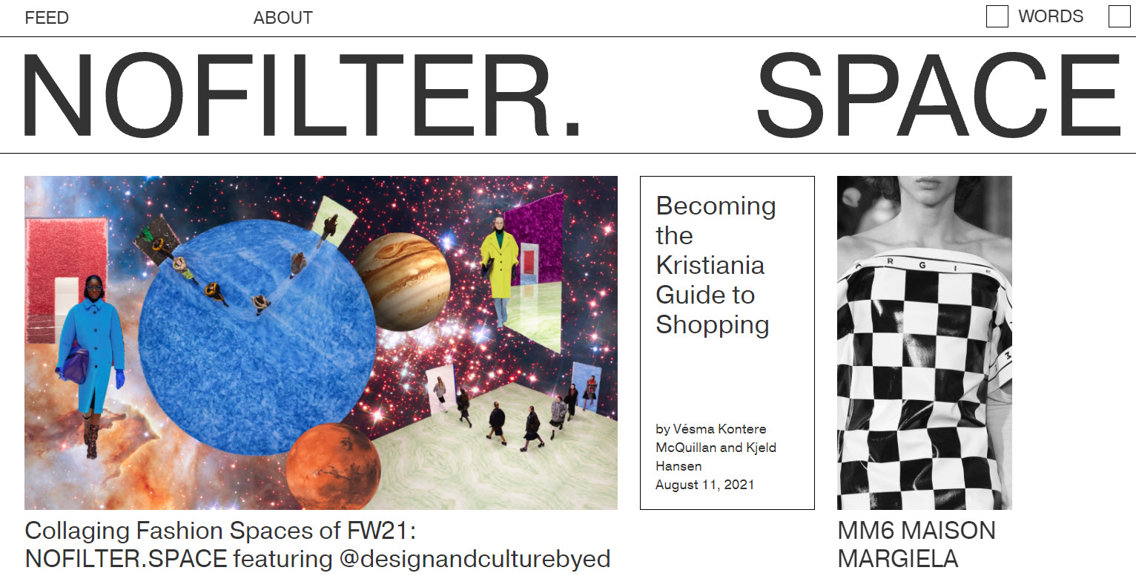Becoming the Kristiania Guide to Shopping
TRENDS: Fashion retail
Fashion retail is essentially the business of buying clothes from manufacturers and brands and selling them to consumers. Fashion shows are essential when brands are selling their latest collections to wholesale and retail.
However, fashion shows are more than fashion business, claims Alexandre de Bettak, a successful producer of fashion shows for the past 25 years.
"The fashion show is a creative form of expression […] a place to champion causes and concerns." (de Bettak & Singer, 2017)
The renowned Dutch architect, Rem Koolhaas, was instrumental in formulating the idea of fashion shopping as a cultural entertainment with his book on retail, The Harvard Guide to Shopping. The architect students of Harvard focused on shopping as a defining factor of urban life and the main reason for the city's existence.
"Shopping is arguably the last remaining form of public activity."(Koolhaas, 2001)
- Read Also: The Innovation Issue: Kunnskap Kristiania (Link to E-magazine)
New typology of fashion retail
With the emergence of the internet and later on the new digital infrastructures, such as streaming and social media platforms, fashion retail has become a multi-channeled business that merges ideas from different disciplines.
In our book, Fashion Spaces/ A Theoretical View we draw on architectural thinking, marketing, and branding theory to conceptualize contemporary fashion shows directed at both retailers and fashion consumers.
We base our conceptualization on two essential components;
- The physical presence, which becomes transformed via ephemeral architecture, and
- The imagined spaces, which is enabled by digitalization and enhanced via interactions on social media.
These new fashion retail typologies were emerging before the SARS-CoV-2 pandemic but have further intensified during periods of social lockdown.
The pandemic also brought changes to the fashion retail landscape. While fashion retailers are struggling to define the right amount of inventory, many fashion manufacturers and brands now choose direct-to-consumer sales models to bypass any fashion retailer.
Going digital with nofilter.space
As we were finalizing the manuscript for our book on Fashion Spaces last spring, we watched in awe how fashion manufacturers and retailers were struggling to convert their businesses to digital.
We decided that to understand the fast-paced current developments in fashion retail properly; we needed to develop a digital site, a webzine (web + magazine) named nofilter.space (link to webzine: https://www.nofilter.space/).
To accommodate and facilitate our students' strong competencies in the digital realm, we decided to use a practice-oriented approach to teaching and research by collaborating with students and local fashion retailers.
- Read also: Nofilter.Space (webzine)
Studying retail design in new ways
With the help of our friends at Oslo-based design agency, Bleed, we created a graphical template with three different contribution formats, Projects, Words, and Reportage, which could facilitate input from researchers, students, and the fashion retail community.
- Projects publish architectural, interior, and design projects within retail design,
- Words focus on reports and essays about the state of fashion retail.
- Reportageis a free format, which favors visual contributions on current trends.
The contribution of both researchers, students, and fashion retailers has helped us understand fashion retail diversity and opened up new innovation avenues of innovation.
To consolidate this new way of studying retail design, we decided to include both students and researchers on the editorial team. Furthermore, we ensured the differentiated representation of students, for example, based on their level of experience, so the more experienced students can pass their knowledge to the younger students while working as a team.
- Read also: The Power of a Story
Rethinking fashion retail
Exploring fashion retail with nofilter.space have brought more benefits than we anticipated.
Building on our previous work, we defined nofilter.space as where architecture, design, and social media meet fashion retail.
However, our weekly publications are continually pushing us to rethink the interdisciplinarity and limits of fashion retail. We are already contemplating expanding our focus with new marketing, branding, and service design ideas.
Both our students and our researchers seem reinvigorated by the prospects of publishing with nofilter.space. Furthermore, they can use their published material as an online portfolio. As researchers, we can use their published work as a reference system for their interests and local and international tendencies and developments.
"To me, NoFilter.Space is a webzine that explores architecture in an incredibly exciting way. Before I started studying at Kristiania, architecture was just buildings. Working on nofilter.space has changed my outlook. I can talk about it all day. But what I find most interesting is the opportunity it gives me to understand, learn and grow."
Christine Kalvik, Senior Editor, 3rd year student at retail design.
Finally, we find that nofilter.space is becoming an up-and-coming tool, a guide for shopping referring to Koolhaas, or engaging with our local fashion retailers and international fashion retail connoisseur. With the webzine, we have opened the door to a new network of people interested in discussing and developing new fashion retail typologies.
References:
- Betak, Alexandre de; Sally Singer. Betak: Fashion Revolution.London: Phaidon Press, 2017
- Chung, Chuihua Judy; Inaba, Jeffrey; Koolhaas, Rem; Leong, Sze Tsung. Harvard Design School Guide for Shopping. Kolh: Taschen, 2, 2001
- McQuillan, Vésma. Fashion Spaces/ A Theoretical View. Amsterdam: Frame, 2020.
- Nofilter.space, Oslo: Webzine published by Kristiania University College.
This article is first published in the Innovation Issue of Kunnskap Kristiania (link to E-Magazine), released on 19th of August 2021.
Text: Professor Vésma K. McQuillan, School of Arts, Design and Media and assistant professor Kjeld Hansen, School of Economics, Innovation and Technology, Kristiania University College.
Feedback:
We would love to hear your opinion. Send your comments and questions regarding this article by E-mail to kunnskap@kristiania.no.


